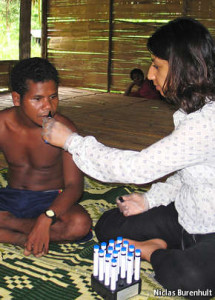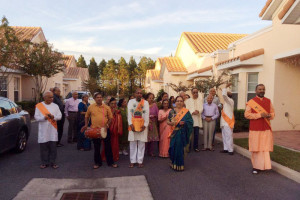 One of the trickier issues that may arise in encounters across cultures is the difference in attitudes towards particular smells, especially body odor. There are distinct cultural associations with smell which vary considerably and can cause friction in cross-cultural encounters. One of the other aspects of smell that are interesting from an intercultural perspective is the connection to language, in particular to what extent languages have vocabularies for describing and distinguishing different smells. An article in the current issue of The Economist describes a presentation recently given by a well-known researcher in the field, Asifa Majid of Radboud University in the Netherlands. She studies Maniq and Jahai speakers (languages in the Austro-Asiatic family), who live in the Malay peninsula. She and her colleagues asked speakers to identify a variety of smells and discovered they could do so much more quickly and with greater confidence than a representative Western group tested. They also had many distinct terms for the smells, which in contrast to Western languages were not based on a smell’s source (i.e. lemony) or its properties (stinky) but were abstract terms used only for that smell. The article concludes:
One of the trickier issues that may arise in encounters across cultures is the difference in attitudes towards particular smells, especially body odor. There are distinct cultural associations with smell which vary considerably and can cause friction in cross-cultural encounters. One of the other aspects of smell that are interesting from an intercultural perspective is the connection to language, in particular to what extent languages have vocabularies for describing and distinguishing different smells. An article in the current issue of The Economist describes a presentation recently given by a well-known researcher in the field, Asifa Majid of Radboud University in the Netherlands. She studies Maniq and Jahai speakers (languages in the Austro-Asiatic family), who live in the Malay peninsula. She and her colleagues asked speakers to identify a variety of smells and discovered they could do so much more quickly and with greater confidence than a representative Western group tested. They also had many distinct terms for the smells, which in contrast to Western languages were not based on a smell’s source (i.e. lemony) or its properties (stinky) but were abstract terms used only for that smell. The article concludes:
This finding challenges the long-standing idea that something about the way human brains are wired limits their ability to put words to smells swiftly. Dr Majid says that in the West, “nothing should have a smell unless you put it there,” and that there are many taboos surrounding talking about odours. The smell-rich environment, scent-centric cultural practices and evident lack of taboos enjoyed by the Jahai and Maniq are, she believes, correlated with their recall and use of smell-related words. It may simply be that having more smells around, and talking about them, ensures that the varieties of smell all have names.
Anyone familiar with the Sapir-Whorf hypothesis in linguistic anthropology will find this familiar, the idea that cultures have an extensive vocabulary for objects and phenomena that are important in their way of life. Survival and success for hunter-gatherers in the bush is likely much more tied to smell than is the case for stock brokers on Wall Street. In an interview Professor Majid describes the extensive organized structure the Jahai and Maniq have for smell terms, akin to color terms in other languages.
